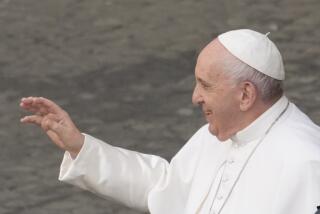Pope Calls Brazil’s Top Bishops to Rome
RIO DE JANEIRO — Pope John Paul II has summoned the leading Roman Catholic bishops of Brazil to Rome for an extraordinary meeting next month.
The purpose of the meeting, scheduled for March 7, has not been announced officially, but church sources here say they expect an examination of the church’s active role in politics, particularly in support of agrarian reform and independent labor unions.
The last time the Pope summoned such a group to Rome was in 1980, when the “progressive” church hierarchy of the Netherlands was admonished by the Pope on questions of doctrine and church organization.
In Brazil, important leaders of the Catholic hierarchy, among them Cardinal Paulo Arns, the archbishop of Sao Paulo, and Cardinal Aloisio Lorscheider, the archbishop of Fortaleza, are identified with the so-called liberation theology movement, which calls for activism by the clergy on social and political matters.
John Paul, who visited Brazil in 1982, has repeatedly criticized as “deviations of the church role” the political activities of progressive priests in the Third World.
Last year, the Vatican ordered Father Leonardo Boff, a Franciscan monk in Brazil who has been a leading theorist and popular exponent of the theology of liberation, to maintain a “penitential silence.”
With the approval of Cardinal Arns and the superiors of the Franciscan Order in Brazil, Boff and his brother, Clovis, published a book last month on liberation theology. It emphasizes the need for political organization of the poorest social sectors to obtain economic and social advancement.
According to bishops here, 20 bishops have been summoned to Rome for the meeting next month, including three cardinals and the president and regional directors of the National Conference of Bishops.
Brazil, with a population of 135 million people, is regarded as the world’s largest Catholic national community. The once-traditional and conservative role of the church here has changed to a progressive stance under the pressure of deep social problems and 20 years of military authoritarianism that ended with the restoration of civilian rule last year.
Income distribution is unequal, with personal wealth concentrated in the top 5% of the population. Included in the great majority are millions of impoverished peasants and slum dwellers.
In liberation theology, the role of the church is defined as an “option in favor of the poor.” Bishops, priests and lay people have organized “base communities” and “reflection groups” among the peasants and the urban poor.
These groups generate new leaders and propagate a critical awareness of social conditions in which the Gospel and church teachings are linked to daily problems of existence.
Recent takeovers of land by peasants in Brazil, aimed at putting pressure on the government to carry out agrarian reform, have in many cases been organized by church-sponsored groups. In many states, there are pastoral commissions that support the peasants, including financial aid to invading squatter families.
Also, the progressive church is identified with a new labor union movement run by the Workers Central Union. This movement organized a successful national bank strike last year and has strong roots in industrial and peasant unions.
The activities of the church progressives here has been sharply criticized by defenders of private property, particularly rural landowners. Criticism has also been expressed by conservative clergymen who deplore political activism.
More to Read
Sign up for Essential California
The most important California stories and recommendations in your inbox every morning.
You may occasionally receive promotional content from the Los Angeles Times.










